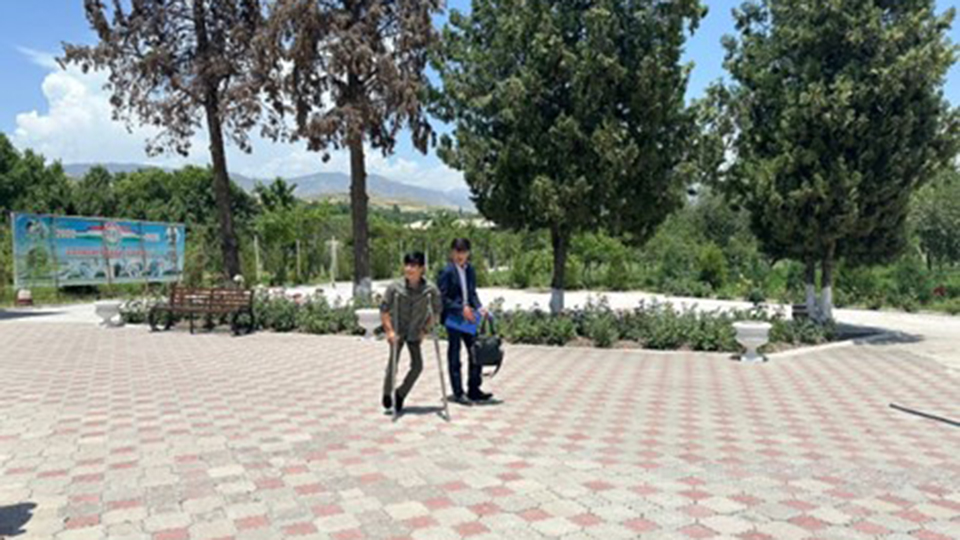

October 8, 2024
A Tajik boarding school for children with disabilities had been struggling with water scarcity for years. WIPO GREEN and WIPO’s Transition and Developed Countries Division (TDC) had facilitated a partnership to address this issue by providing water management solutions, including tanks and sensors earlier this year. This impact story is a part of the WIPO’s Acceleration Project in the region.
The Republican Special System Boarding School, located in Hisor, Tajikistan, has been an educational and rehabilitation center for children with disabilities since 1983. Initially set up to serve children affected by poliomyelitis and cerebral palsy, the school today accommodates 300 students, providing education and treatment. With teachers, technicians, and support staff, the institution also provides livelihoods for many families in the region.

However, for years, the school has faced a persistent and significant challenge: access to a reliable water supply for its garden and agricultural activities. Earlier this year, WIPO GREEN’s matchmaking acceleration project together with WIPO’s Transition and Developed Countries Division (TDC) at the school resulted in local partners, philanthropists, and consultants from Moores Rowland Tajikistan providing proper water management through water tanks, valves, sensors, and insulation. This time round, water pumps were deployed.
The boarding school operates across nearly 7.5 hectares of land, growing a variety of fruits and vegetables to supplement the children’s diet. The school grounds are home to fruit trees that produce fresh produce in the summer, which is then preserved for winter use. There is also a vegetable garden that yields tomatoes, cucumbers, sweet peppers, potatoes, and onions, all contributing to the student’s healthy diet.
The school’s administration had previously made efforts to secure a reliable water source, but equipment failures, financial constraints, and technical challenges made progress difficult.
Given that there was no irrigation water supply system, the school administration began by rebuilding the transformer substation and laying down a line to connect pumping equipment for irrigation. They invested in submersible pump installations by the nearby river and obtained the necessary permits for drawing water. Despite best efforts, the equipment often broke down due to high river flows. It was clear that a more sustainable, long-term solution was required. This is where the WIPO GREEN acceleration project stepped in.
Recognizing the broader impact that a stable water supply would have on the school, WIPO GREEN on-ground consultants, Moores Rowland Tajikistan, conducted a detailed study to identify the most efficient solution. They discovered that the school needed a stronger surface pump to handle the demands of the mountainous river water supply. The equipment had to be capable of withstanding high flow rates and be suitable for the school’s long-term needs.
WIPO GREEN on-ground consultants identified and secured funding from local investors for a pump that could solve the school’s irrigation issues. The Sturm WP9705A pump was chosen for its power, durability, and low noise levels. It also offered the added benefit of an overheating protection system, making it suitable for pumping clean or moderately contaminated water from the river.
According to the team, the pump could be used for pumping water with temperatures from 0 to 50 degrees Celsius. Further, with a capacity of 45 liters per minute, the pump met the school’s irrigation needs. After the equipment was installed, the difference noted was significant: the boarding school had consistent and reliable water supply for irrigation as well as other uses such as cleaning and maintaining the grounds.
The water supply improvements accomplished through the pump will certainly support future harvests of the vegetable garden allowing the school to supply fresh produce throughout the year. But impact of the improved water supply goes beyond just the harvest: students are able to resume hands-on gardening, supporting their learning and rehabilitation through direct engagement with the garden. The project also serves as a practical example of responsible water management, providing students with valuable lessons in environmental stewardship.
Since this deployment follows the earlier technology deployment of the WIPO GREEN acceleration project in May 2024, the project shows how WIPO GREEN’s focused and practical interventions can lead to significant improvements in the lives of vulnerable communities.
By ensuring a steady water supply, WIPO GREEN and Moores Rowland Tajikistan have helped the school not only continue but expand its mission of providing education and therapy for children with disabilities. Their support means that the boarding school now has the resources to enhance its educational programs, promote sustainable practices, and improve the overall quality of life for its students.
The Republican Special System Boarding School’s success story is a reminder that even small-scale interventions can have a profound impact. Other institutions and stakeholders facing similar challenges can look at this model as they seek good technology-based solutions.
The WIPO GREEN database is a free, solutions oriented, global innovation catalogue that connects needs for solving environmental or climate change problems with tangible solutions. The database consists of user uploads of needs and solutions, green technology patents from the WIPO Patentscope database, imports from select partner organizations, relevant knowledge material, and relevant expert profiles.